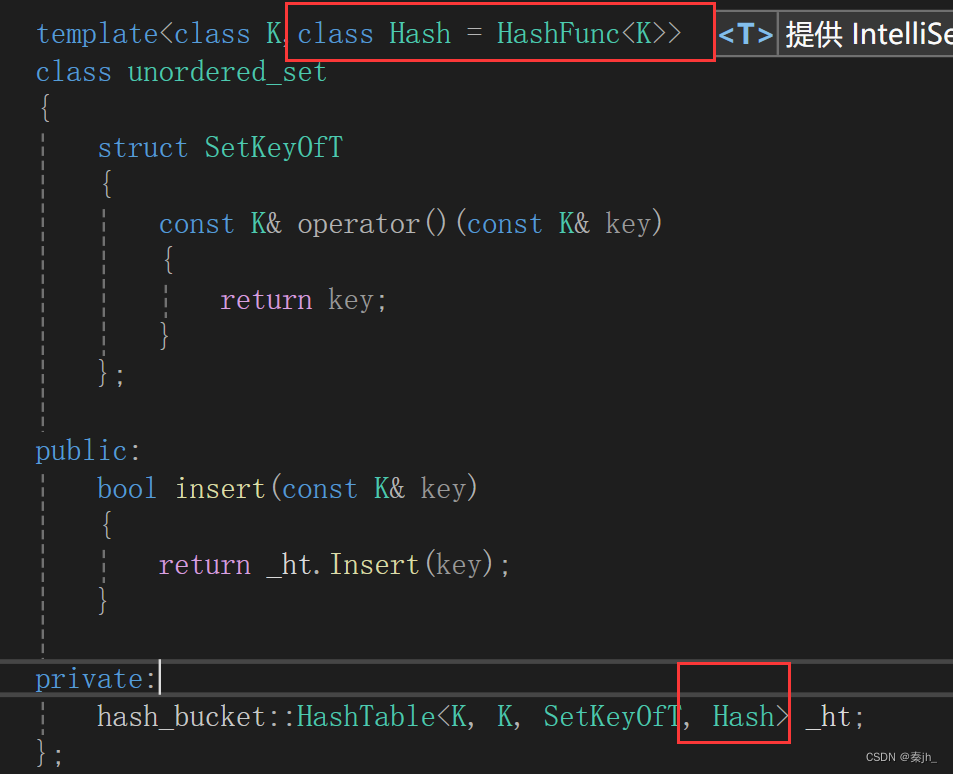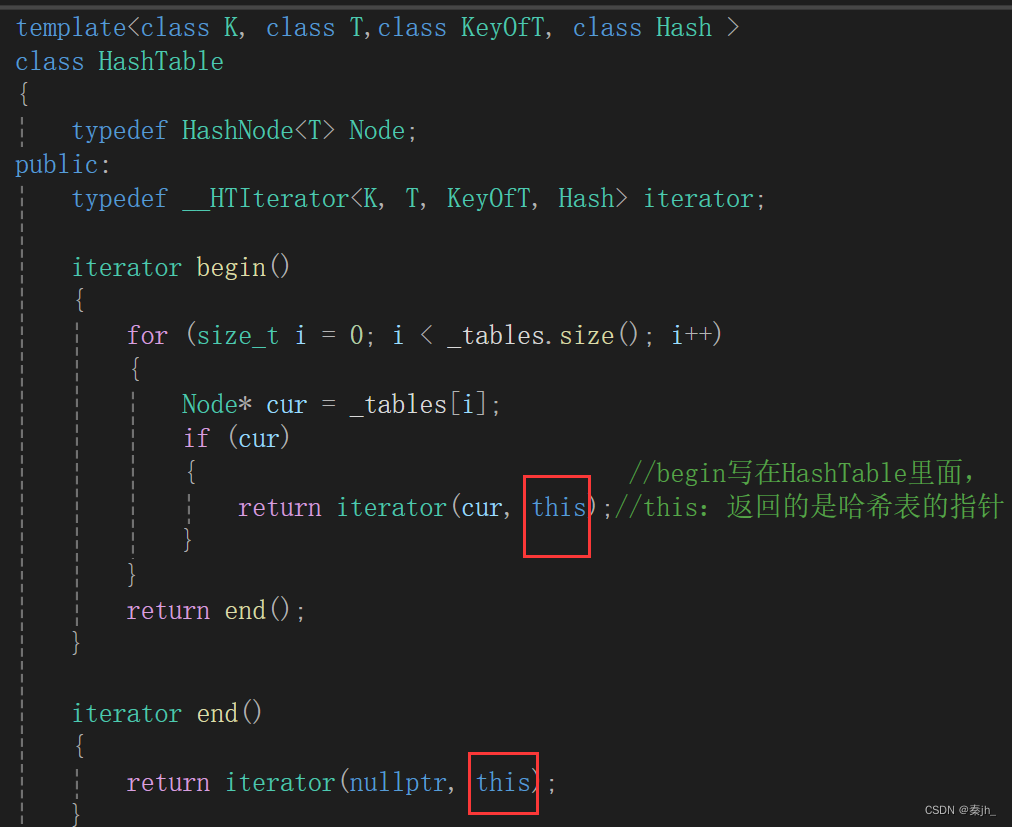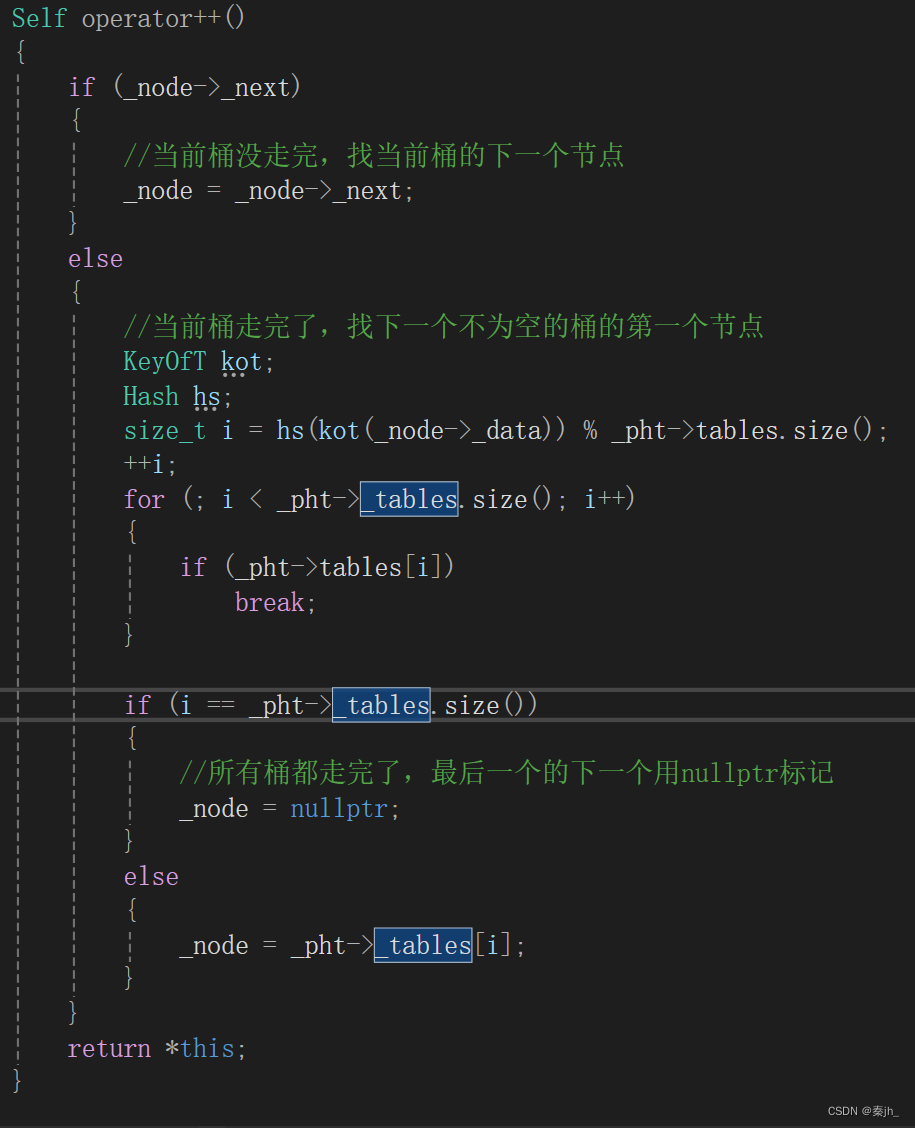🌈个人主页:秦jh_-CSDN博客
🔥 系列专栏:https://blog.csdn.net/qinjh_/category_12575764.html?spm=1001.2014.3001.5482

目录
key和pair
仿函数hash
迭代器
operator++
HashTable.h
my_unordered_map.h
my_unordered_set.h
前言
💬 hello! 各位铁子们大家好哇。
今日更新了unordered_map和unordered_set封装的相关内容
🎉 欢迎大家关注🔍点赞👍收藏⭐️留言📝
key和pair
前面已经实现了哈希的底层,现用哈希进行封装。


unordered_set和unordered_map的封装和map、set大体思路一样。hash是底层,他并不知道传入的是k还是pair,但是上层的unordered_set和unordered_map知道。所以在hash多传入一个模板参数KeyOfT,这样再在map和set中分别实现取出key的逻辑即可。
仿函数hash



由于hash现在是底层,我们的仿函数不可能直接传给hash底层,所以得在unordered_set和unordered_map上传多一个模板参数,这样取模的仿函数就可以在外面传了。
迭代器


当遍历完一个桶后,准备找下一个桶时,就需要有哈希表,不然就找不到下一个桶,所以iterator需要传第二个参数:哈希表的指针。
operator++

当当前桶走完了,就要找下一个不为空的桶的第一个节点。循环结束有两种可能,一:所有桶都走完了。二:找到下一个不为空的桶。
HashTable.h
#pragma once
#include<vector>
template<class K>
struct HashFunc
{
size_t operator()(const K& key)
{
return (size_t)key; //负数、指针都能转
}
};
//特化
template<>
struct HashFunc<string>
{
size_t operator()(const string& key)
{
size_t hash = 0;
for (auto ch : key)
{
hash *= 131;
hash += ch;
}
return hash;
}
};
namespace open_address
{
enum State
{
EMPTY,
EXIST,
DELETE
};
template<class K, class V>
struct HashData
{
pair<K, V> _kv;
State _state = EMPTY;
};
template<class K, class V, class Hash = HashFunc<K>>
class HashTable
{
public:
HashTable()
{
_tables.resize(10);
}
bool Insert(const pair<K, V>& kv)
{
if (Find(kv.first)) //不允许冗余
return false;
//扩容
if (_n * 10 / _tables.size() >= 7)
{
//方法一
//size_t newsize = _tables.size() * 2; //用vector的话需要手动映射
//vector<HashData<K, V>> newtables(newsize);
旧表重新计算负载到新表
//for(size_t i=0;i<_tables.size();i++)
//{ }
//方法二
HashTable<K, V, Hash> newHT;
newHT._tables.resize(_tables.size() * 2);
//旧表重新计算负载到新表
for (size_t i = 0; i < _tables.size(); i++)
{
if (_tables[i]._state == EXIST)
{
newHT.Insert(_tables[i]._kv);//用HashTable对象插入,可以复用Insert,不需要手动映射
} //newHT已经是扩容好的了,就跳过扩容,直接来到探测部分
} //新表插入好后,再跟旧表互换
_tables.swap(newHT._tables);
}
Hash hs;
size_t hashi = hs(kv.first) % _tables.size(); //不能模capacity,否则会得到比size大的数,而size后面的位置不能用[]得到
//线性探测
while (_tables[hashi]._state == EXIST)
{
++hashi;
hashi %= _tables.size(); //如果往后找找不到,就回到前面继续找
}
_tables[hashi]._kv = kv;
_tables[hashi]._state = EXIST;
++_n;
return true;
}
HashData<K, V>* Find(const K& key)
{
Hash hs;
size_t hashi = hs(key) % _tables.size();
//线性探测
while (_tables[hashi]._state != EMPTY)
{
if (_tables[hashi]._state == EXIST &&
_tables[hashi]._kv.first == key)
{
return &_tables[hashi];
}
++hashi;
hashi %= _tables.size();
}
return nullptr;
}
bool Erase(const K& key)
{
HashData<K, V>* ret = Find(key);
if (ret == nullptr)
{
return false;
}
else
{
ret->_state = DELETE;
--_n;
return true;
}
}
private:
vector<HashData<K, V>> _tables;
size_t _n = 0; //有效数据个数
};
void TestHT1()
{
int a[] = { 10001,11,55,24,19,12,31 };
HashTable<int, int> ht;
for (auto e : a)
{
ht.Insert(make_pair(e, e));
}
cout << ht.Find(55) << endl;
cout << ht.Find(31) << endl;
ht.Erase(55);
cout << ht.Find(55) << endl;
cout << ht.Find(31) << endl;
}
void TestHT2()
{
int a[] = { 10001,11,55,24,19,12,31 };
HashTable<int, int> ht;
for (auto e : a)
{
ht.Insert(make_pair(e, e));
}
ht.Insert(make_pair(32, 32));
ht.Insert(make_pair(32, 32));
}
//如果key不支持强转成整形取模,就要自己提供转换成整形的仿函数
void TestHT3()
{
HashTable<string, int> ht;
ht.Insert(make_pair("sort", 1));
ht.Insert(make_pair("left", 1));
ht.Insert(make_pair("insert ", 1));
//cout << StringHashFunc()("abcd") << endl;
//cout << StringHashFunc()("aadd") << endl;
}
}
namespace hash_bucket
{
template<class T>
struct HashNode
{
T _data;
HashNode<T>* _next;
HashNode(const T& data)
:_data(data)
,_next(nullptr)
{}
};
//前置声明
//HashTable需要用到__HTIterator,__HTIterator也需要用到HashTable
//所以只能用前置声明
template<class K, class T, class KeyOfT, class Hash >
class HashTable;
//template<class K, class T,class KeyOfT, class Hash >
//struct __HTIterator
//{
// typedef HashNode<T> Node;
// typedef __HTIterator<K, T, KeyOfT, Hash> Self;
// Node* _node;
// HashTable<K, T, KeyOfT, Hash>* _pht; //当前桶为空的时候需要找下一个桶,就需要表才能找到下一个桶
// __HTIterator(Node* node,HashTable<K,T,KeyOfT,Hash>* pht)
// :_node(node)
// ,_pht(pht)
// {}
// T& operator*()
// {
// return _node->_data;
// }
// T* operator->()
// {
// return &_node->_data;
// }
// Self operator++()
// {
// if (_node->_next)
// {
// //当前桶没走完,找当前桶的下一个节点
// _node = _node->_next;
// }
// else
// {
// //当前桶走完了,找下一个不为空的桶的第一个节点
// KeyOfT kot;
// Hash hs;
// size_t i = hs(kot(_node->_data)) % _pht->_tables.size();
// ++i;
// for (; i < _pht->_tables.size(); i++)
// {
// if (_pht->_tables[i])
// break;
// }
// if (i == _pht->_tables.size())
// {
// //所有桶都走完了,最后一个的下一个用nullptr标记
// _node = nullptr;
// }
// else
// {
// _node = _pht->_tables[i];
// }
// }
// return *this;
// }
// bool operator!=(const Self& s)
// {
// return _node != s._node;
// }
//};
template<class K ,class T,class KeyOfT, class Hash >
class HashTable
{
typedef HashNode<T> Node;
public:
//__HTIterator需要访问HashTable的私有,所以用友元
/*template<class K, class T, class KeyOfT, class Hash >
friend struct __HTIterator;*/
//内部类
template<class Ptr, class Ref>
struct __HTIterator
{
typedef HashNode<T> Node;
typedef __HTIterator Self;
Node* _node;
const HashTable* _pht; //当前桶为空的时候需要找下一个桶,就需要表才能找到下一个桶
__HTIterator(Node* node,const HashTable* pht)
:_node(node)
,_pht(pht)
{}
Ref operator*()
{
return _node->_data;
}
Ptr operator->()
{
return &_node->_data;
}
Self operator++()
{
if (_node->_next)
{
//当前桶没走完,找当前桶的下一个节点
_node = _node->_next;
}
else
{
//当前桶走完了,找下一个不为空的桶的第一个节点
KeyOfT kot;
Hash hs;
size_t i = hs(kot(_node->_data)) % _pht->_tables.size();
++i;
for (; i < _pht->_tables.size(); i++)
{
if (_pht->_tables[i])
break;
}
if (i == _pht->_tables.size())
{
//所有桶都走完了,最后一个的下一个用nullptr标记
_node = nullptr;
}
else
{
_node = _pht->_tables[i];
}
}
return *this;
}
bool operator!=(const Self& s)
{
return _node != s._node;
}
};
typedef __HTIterator<T*,T&> iterator;
typedef __HTIterator<const T*,const T&> const_iterator;
iterator begin()
{
for (size_t i = 0; i < _tables.size(); i++)
{
Node* cur = _tables[i];
if (cur)
{ //this ->HashTable* //begin写在HashTable里面,
return iterator(cur, this);//this:返回的是哈希表的指针
}
}
return end();
}
iterator end()
{
return iterator(nullptr, this);
}
const_iterator begin()const
{
for (size_t i = 0; i < _tables.size(); i++)
{
Node* cur = _tables[i];
if (cur)
{ //this ->const HashTable* //begin写在HashTable里面,
return const_iterator(cur, this);//this:返回的是哈希表的指针
}
}
return end();
}
const_iterator end()const
{
return const_iterator(nullptr, this);
}
HashTable()
{
_tables.resize(10, nullptr);
_n = 0;
}
~HashTable()
{
for (size_t i = 0; i < _tables.size(); i++)
{
Node* cur = _tables[i];
while (cur)
{
Node* next = cur->_next;
delete cur;
cur = next;
}
_tables[i] = nullptr;
}
}
pair<iterator,bool> Insert(const T& data)
{
KeyOfT kot;
iterator it = Find(kot(data));
if (it!= end())
return make_pair(it,false);
Hash hs;
//扩容
//负载因子为1时扩容
if (_n == _tables.size())
{
//HashTable<K, V> newHT;
//newHT._tables.resize(_tables.size() * 2);
旧表重新计算负载到新表
//for (size_t i = 0; i < _tables.size(); i++)
//{
// Node* cur = _tables[i];
// while(cur)
// {
// newHT.Insert(cur->_kv);
// cur = cur->_next;
// }
//}
//_tables.swap(newHT._tables);
vector<Node*> newTables(_tables.size() * 2, nullptr);
for (size_t i = 0; i < _tables.size(); i++)
{
Node* cur = _tables[i];
while(cur)
{
Node* next = cur->_next;
//头插到新表的位置
size_t hashi = hs(kot(cur->_data)) % newTables.size();
cur->_next = newTables[hashi];
newTables[hashi] = cur;
cur = next;
}
_tables[i] = nullptr;
}
_tables.swap(newTables);
}
size_t hashi = hs(kot(data)) % _tables.size();
Node* newnode = new Node(data);
//头插
newnode->_next = _tables[hashi];
_tables[hashi] = newnode;
++_n;
return make_pair(iterator(newnode,this),true);
}
iterator Find(const K& key)
{
KeyOfT kot;
Hash hs;
size_t hashi = hs(key) % _tables.size();
Node* cur = _tables[hashi];
while (cur)
{
if (kot(cur->_data) == key)
{
return iterator(cur,this);
}
cur = cur->_next;
}
return end();
}
bool Erase(const K& key)
{
KeyOfT kot;
Hash hs;
size_t hashi = hs(key) % _tables.size();
Node* prev = nullptr;
Node* cur = _tables[hashi];
while (cur)
{
if (kot(cur->_data) == key)
{
//如果删除的是第一个
if (prev == nullptr)
{
_tables[hashi] = cur->_next;
}
else
{
prev->_next = cur->_next;
}
delete cur;
return true;
}
else
{
prev = cur;
cur = cur->_next;
}
}
return false;
}
private:
vector<Node*> _tables; //指针数组
size_t _n;
//vector<list<pair<K, V>>> _tables;
};
/*void TestHT1()
{
int a[] = { 10001,11,55,24,19,12,31,4,34,44 };
HashTable<int, int> ht;
for (auto e : a)
{
ht.Insert(make_pair(e, e));
}
ht.Insert(make_pair(32, 32));
ht.Insert(make_pair(32, 32));
ht.Erase(31);
ht.Erase(11);
}
void TestHT2()
{
HashTable<string, int> ht;
ht.Insert(make_pair("sort", 1));
ht.Insert(make_pair("left", 1));
ht.Insert(make_pair("insert ", 1));
}*/
}my_unordered_map.h
#pragma once
namespace qjh
{
template<class K,class V, class Hash = HashFunc<K>>
class unordered_map
{
struct MapKeyOfT
{
const K& operator()(const pair<K, V>& kv)
{
return kv.first;
}
};
public:
typedef typename hash_bucket::HashTable<K, pair<const K,V>, MapKeyOfT, Hash >::iterator iterator;
typedef typename hash_bucket::HashTable<K, pair<const K, V>, MapKeyOfT, Hash >::const_iterator const_iterator;
iterator begin()
{
return _ht.begin();
}
iterator end()
{
return _ht.end();
}
const_iterator begin() const
{
return _ht.begin();
}
const_iterator end() const
{
return _ht.end();
}
V& operator[](const K& key)
{
pair<iterator, bool> ret = insert(make_pair(key, V()));
return ret.first->second;
}
pair<iterator, bool> insert(const pair<K, V>& key)
{
return _ht.Insert(key);
}
private:
hash_bucket::HashTable<K, pair<const K, V>, MapKeyOfT,Hash > _ht;
};
void test_unordered_map1()
{
string arr[] = { "苹果","西瓜","苹果","西瓜","苹果","苹果","西瓜",
"苹果","香蕉","苹果","香蕉","苹果","草莓","苹果","草莓" };
unordered_map<string, int> countmap;
for (auto& e : arr)
{
countmap[e]++;
}
unordered_map<string,int>::iterator it = countmap.begin();
while (it != countmap.end())
{
//it->first += 'x'; //key不能修改
it->second += 1; //value可以修改
cout << it->first << ":" << it->second << endl;
++it;
}
cout << endl;
for (auto& kv : countmap)
{
cout << kv.first << ":" << kv.second << endl;
}
cout << endl;
}
}my_unordered_set.h
#pragma once
#include"HashTable.h"
namespace qjh
{
template<class K,class Hash = HashFunc<K>>
class unordered_set
{
struct SetKeyOfT
{
const K& operator()(const K& key)
{
return key;
}
};
public:
typedef typename hash_bucket::HashTable<K, const K, SetKeyOfT, Hash>::iterator iterator;
typedef typename hash_bucket::HashTable<K, const K, SetKeyOfT, Hash>::const_iterator const_iterator;
iterator begin()
{
return _ht.begin();
}
iterator end()
{
return _ht.end();
}
const_iterator begin() const
{
return _ht.begin();
}
const_iterator end() const
{
return _ht.end();
}
pair<iterator, bool> insert(const K& key)
{
return _ht.Insert(key);
}
iterator find(const K& key)
{
return _ht.Find(key);
}
bool erase(const K& key)
{
return _ht.Erase(key);
}
private:
hash_bucket::HashTable<K,const K, SetKeyOfT, Hash> _ht;
};
void Func(const unordered_set<int>& s)
{
unordered_set<int>::iterator it = s.begin();
while (it != s.end())
{
//*it = 1;
cout << *it << " ";
++it;
}
cout << endl;
}
void test_unordered_set()
{
unordered_set<int> s;
s.insert(31);
s.insert(11);
s.insert(5);
s.insert(15);
s.insert(25);
unordered_set<int>::iterator it = s.begin();
while (it != s.end())
{
//*it = 1;
cout << *it << " ";
++it;
}
cout << endl;
for (auto e : s)
{
cout << e << " ";
}
cout << endl;
}
}


















